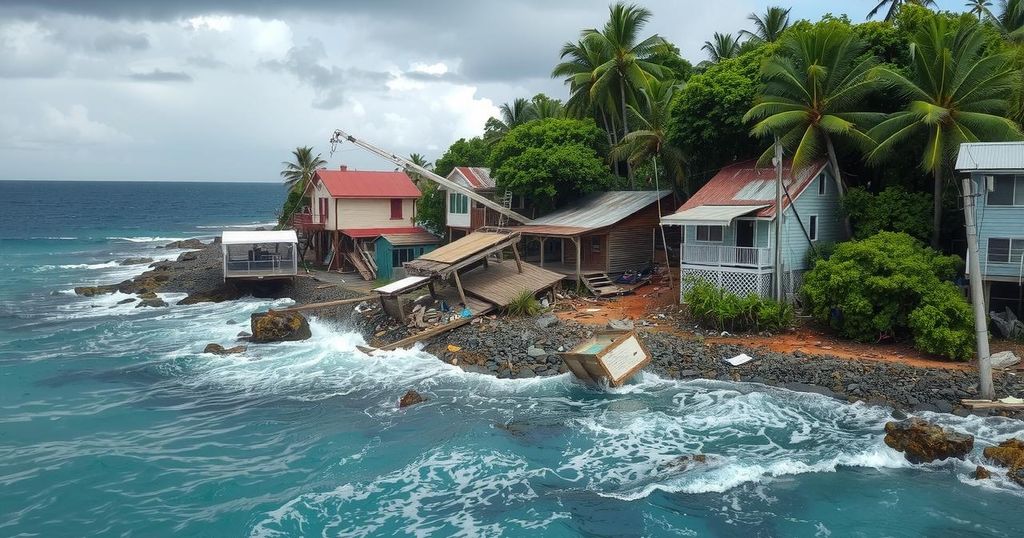Severe Impact of Cyclone Chido on Mayotte: Rising Death Toll and Extensive Damage

Cyclone Chido has severely impacted Mayotte, resulting in at least 11 confirmed deaths and extensive injuries, with rescue efforts hampered by infrastructural damage. Interior Minister Bruno Retailleau is deploying additional forces to assist in recovery operations, but widespread destruction has left many without electricity and healthcare. The cyclone’s potency exemplifies growing climate-related risks in the region.
Devastation has struck the French overseas territory of Mayotte due to Cyclone Chido, which resulted in catastrophic damage over the recent weekend. French Interior Minister Bruno Retailleau stated that the confirmed fatalities reached at least 11, with speculation suggesting that this number could rise, as Mayotte authorities initially reported 14 deaths. The challenges in accurately assessing casualties and injuries persist, given that 246 individuals are reported injured, with nine in critical condition.
Minister Retailleau is scheduled to visit Mayotte, accompanied by a contingent of 160 soldiers and firefighters, bolstering the existing 110 personnel dispatched prior to the storm’s landfall. Cyclone Chido wreaked havoc not only in Mayotte but also impacted the nearby Comoros and Madagascar. Officials indicated this cyclone was the most severe to hit Mayotte in 90 years, leading to widespread destruction of infrastructure and residential areas.
Following the cyclone, rescue operations are underway, although they are hampered by infrastructural damage, including the destruction of airports and power lines, exacerbating the ongoing water shortages in the region. The cyclone’s winds reached gusts exceeding 226 kilometers per hour, obliterating numerous shantytowns, as described by Minister Retailleau in a crisis briefing.
With over 15,000 households currently without electricity and significant disruptions to telephone services, the Mayotte hospital center has suffered substantial damage, impairing the healthcare response. The neighboring Comoros, while impacted to a lesser extent, also experienced flooding and infrastructure damage.
According to UNICEF, emergency efforts are mobilizing to support the victims impacted by Cyclone Chido, which forms a part of a worrying pattern of increasingly powerful storms attributed to climate change, as noted by meteorologists. The United Nations has warned that as many as 2.5 million people in Mozambique and adjacent regions could be affected by the storm’s remnants, heightening concerns over humanitarian crises in the face of natural disasters fueled by changing climate conditions.
Cyclone Chido exemplifies the patterns of extreme weather events increasingly observed in recent years, largely attributed to climate change. It has struck with unprecedented severity, inflicting extensive damage not only in Mayotte but also impacting nearby regions such as the Comoros and parts of mainland Africa. The cyclone’s effects highlight underlying vulnerabilities in infrastructure and emergency preparedness, particularly in remote territories like Mayotte, where logistical challenges significantly impede timely response efforts. Experts have linked the strength of such storms to rising sea temperatures, emphasizing the need for comprehensive disaster preparedness and response strategies in the context of global climate change.
In summary, Cyclone Chido has led to significant devastation in Mayotte, with a rising death toll and extensive infrastructure damage. Emergency response efforts are underway, but the challenges posed by the cyclone’s ferocity and the existing vulnerabilities in the region demand urgent attention. The situation in Mayotte underlines the broader implications of climate-induced disasters, necessitating a reassessment of disaster response mechanisms and support structures in vulnerable regions.
Original Source: www.lemonde.fr








